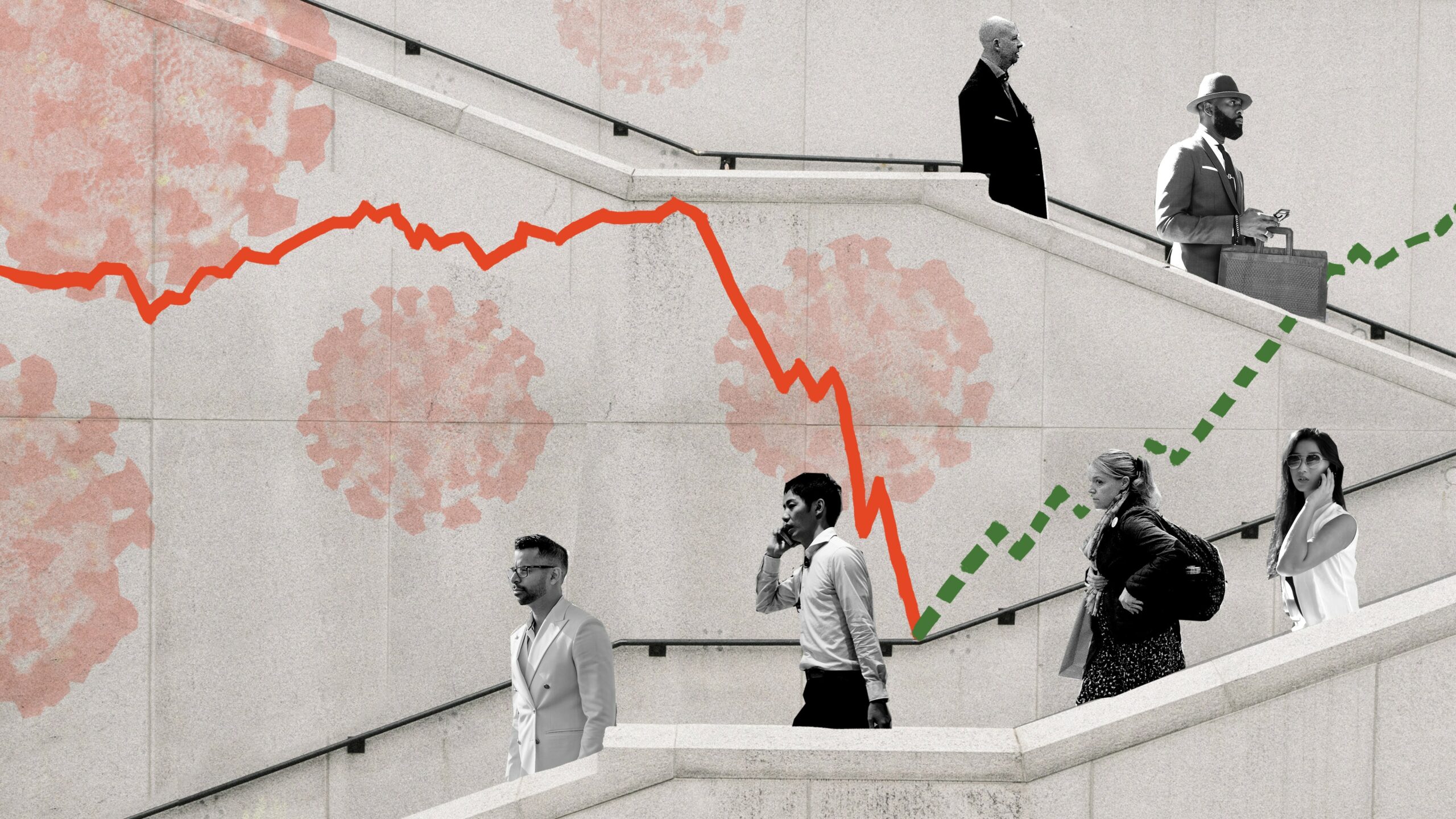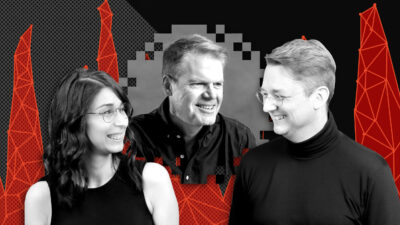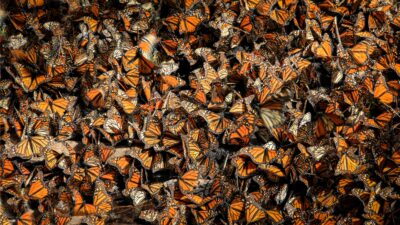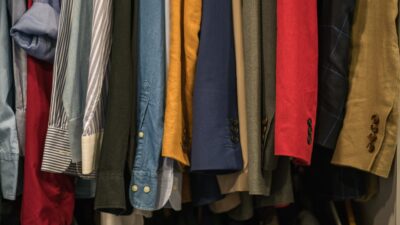Sandra Peter and Kai Riemer

The business of vaccines on Corona Business Insights
The business of vaccines: investment, research risks, pricing, manufacturing, and distributing a COVID-19 vaccine.
As COVID-19 sets out to change the world forever, join Sandra Peter and Kai Riemer as they think about what’s to come in the future of business.
Shownotes
NYT vaccine tracker with overview of different vaccine types
The development process of vaccines is changing
UPS builds soccer field sized freezer farms for coronavirus vaccine (more here in a video)
Delivering super-cooled vaccines is a challenge for some countries
Indian’s billionaires bet big on coronavirus vaccine
Moderna’s CEO on the m.R.N.A. approach on Frekonomics
It will take years to manufacture and distribute a COVID-19 vaccine
This episode is part of a podcast series covering what COVID-19 will mean for the business world, where we look at the impact on the economy, businesses, industries, workers and society. This is part of our ongoing coverage of the impact of COVID-19 on the future of business.
Follow the show on Apple Podcasts, Spotify, Overcast, Google Podcasts, Pocket Casts or wherever you get your podcasts. You can follow Sydney Business Insights on Flipboard, LinkedIn, Twitter and WeChat to keep updated with our latest insights.
Send us your news ideas to sbi@sydney.edu.au.
Dr Sandra Peter is the Director of Sydney Executive Plus and Associate Professor at the University of Sydney Business School. Her research and practice focuses on engaging with the future in productive ways, and the impact of emerging technologies on business and society.
Kai Riemer is Professor of Information Technology and Organisation, and Director of Sydney Executive Plus at the University of Sydney Business School. Kai's research interest is in Disruptive Technologies, Enterprise Social Media, Virtual Work, Collaborative Technologies and the Philosophy of Technology.
Share
We believe in open and honest access to knowledge.
We use a Creative Commons Attribution NoDerivatives licence for our articles and podcasts, so you can republish them for free, online or in print.
Transcript
Intro From the University of Sydney Business School, this is Sydney Business Insights.
Sandra And this is Corona Business Insights. I'm Sandra Peter.
Kai And I'm Kai Riemer.
Sandra And we're back unpacking the impact of COVID-19 on business, the economy, industry, government, workers and society, and looking at the effects of the pandemic.
Kai And this podcast is part of a larger initiative by the University of Sydney Business School.
Sandra You can find our COVID business impact dashboard online at sbi.sydney.edu.au/coronavirus.
Kai And today we talk about the business of vaccines to fight the COVID-19 pandemic.
Sandra And of course, we are no health experts. So we won't be weighing in on which vaccines are effective or what the likely timelines are for the vaccines. But we will be looking at the business of researching vaccines, pricing it, manufacturing it, distributing it, and also some long term impacts of having a COVID-19 vaccine.
Kai And so what we want to highlight is that it is not only challenging from a medical perspective to produce a functioning vaccine that protects against the virus, it is also challenging to actually produce, manufacture, distribute this vaccine at a global scale.
Sandra So let's start by having a very brief look at the vaccines in development because they do have an influence of how they're being manufactured and how they will be distributed and how they're being priced. There are currently close to 170 vaccines in development with I think over 30 of them in clinical trials, and that's according to the World Health Organisation. And some of these vaccines use high tech methods that have not yet been proven to work in any kind of drug. While other vaccines use more traditional methods with long track records where we are quite familiar with ways in which these can be produced and distributed.
Kai Well, there's four kinds of vaccine types that are being researched around the world. The first one is genetic vaccines, which basically insert into the body part of the coronavirus's own genes, and then get the body to create the characteristic spike protein, which in itself is harmless, but then leads the body to create antibodies against this spike protein to attack the virus. While this is the most innovative way to produce vaccines, it is also unproven. We have not had any vaccine or other drug being approved around the world and yet they are multiple promising candidates in development. The most well-known ones are the one done by Moderna in the US which is in stage three trials. So large scale human trials. There's two candidates out of Germany one by BioNTech, in collaboration with Pfizer. The second one works slightly differently. It's called viral vector vaccines. Which basically use a different virus, it can be a chimpanzee virus, which is used by Oxford and AstraZeneca. Or a human virus, which is used by the Chinese company CanSinoBIO, which is the one currently leading development in its stage three trials, which use this virus to then insert into the body the viral proteins, again provoking an immune response. The third kind is called protein-based, which basically insert the coronavirus protein, the spike protein into the body. That's the technique used by University of Queensland here in Australia in collaboration with CSL, again to provoke the immune response. And while these three types basically work without the actual virus, the most well-known way to produce a vaccine is still the whole virus method which basically uses a weakened or inactivated virus to provoke the immune response. And there is a number of Chinese companies that are leading development in this area, most notable Sinovac Biotech, which is already in stage three trials.
Sandra So with the entire world now rushing to get their hands on a vaccine, it would seem like a good business to be in, but actually the business of vaccine is a very costly, very risky business with very little reward.
Kai So normally it can take 10, sometimes 15 years to develop a vaccine. And with lots of vaccines, they are one of inoculations or once the population has been inoculated, the business basically breaks away and there's very little repeat business and each person only needs to take something once. So from a business point of view, vaccines are not great business under normal circumstances. And so with the COVID-19 pandemic, while we understand the immense cost that this pandemic has put on the world economies, and the urgent need to have a vaccine, if vaccines are not great business, how does it work?
Sandra So what we want to do is have a look at how the business of the COVID-19 vaccine is different from vaccines in general, because let's remember this is first a global pandemic. And we're trying to get to this vaccine on a reduced timeline. So first of all, there's the huge investment that has been done, the huge capital that's been risked on this 170 vaccines and most of that is taxpayer money, government money, but also private corporations and a whole host of philanthropists like Bill Gates through the Bill Gates Foundation.
Kai Also, it is widely expected that this coronavirus vaccine might actually be more like an influenza vaccine, which is a yearly vaccine, so that makes it a different business proposition. There is also the huge image benefits that might come from being the first or one of the first ones to have a functioning vaccine. So corporations, research institutes are jockeying for position, wanting to be among those first successful ones.
Sandra So, so far a lot of the attention has focused just on the pricing of the vaccine, with companies like Johnson and Johnson and AstraZeneca, saying that they would consider selling their vaccines that cost, at least during the pandemic. Many other companies like Pfizer or Merck, or Moderna said that they do plan to make a profit.
Kai
There's also of course, discussions about different price points for developed countries versus developing countries. Because remember, we need to roll out this vaccine globally. If we want to enable international travel. It cannot just be, you know, your own country that gets the vaccine, we need to make sure that it is distributed everywhere, which needs to be taken into account in the pricing.
Sandra Then there's the question of the manufacturing business model. To immunise the world with what might end up being a two-dose or a three-dose vaccine we would need billions and billions of doses, far exceeding the current In total vaccine manufacturing capacity that the world has.
Kai Which stands at about 6.4 billion doses globally per year not enough to produce COVID-19 vaccine for everyone. So around the world manufacturing capacity is being ramped up. It's expected that we need to have at least 12 to 15 billion doses initially. And also keep in mind that a lot of this capacity is already tied up in producing other vaccines for other diseases like the annual influenza.
Sandra In many places around the world factories have already started producing some of the vaccines that are in late trial stages, in the hope that these trials will be successful and that then these doses can already be distributed.
Kai So we'll put an article from the New York Times in the shownotes which showcases the Serum Institute in Pune, India which is actually the largest vaccine producer in the world. And it's a family-owned business, significantly, that doesn't have to answer to shareholders. And the family has taken it upon itself to already start producing the Oxford AstraZeneca vaccine under a licence agreement, which allows them to produce 1 billion doses in total. And they expect to have 300 million doses ready by November, mind you, before we even know whether this is an effective vaccine. So it's a huge bet, which the company has taken on its own purse investing $450 million for things like ordering hundreds of millions of glass vials for those vaccine doses to be ready to not only roll out the vaccine to India, but also to many developing countries in the world, which is what this company does. It's such an interesting story, we urge you to read it. Half the world's children have been inoculated with vaccines coming out of this factory. So it's a real standout feel good story in and amongst this pandemic. And we should all hope that this vaccine is successful so that not only Western countries jockeying for position, spending large amounts of money can get the vaccine, but also many of the developing countries.
Sandra And manufacturing and delivering this new vaccine also presents other difficulties. Remember, we discussed the mRNA, the new ways of making vaccines that have not yet been proven or used? Well, this also meant that we don't actually have these supply chains in place that can deliver these drugs safely to many parts of the world. This is why companies like UPS are actually building giant freezer farms the size of football fields, where UPS is hoping to store millions of doses of coronavirus vaccines in order to ship them around the world. It turns out that many of these new types of vaccines have to be stored at very cold temperatures, much colder than what we're used to with traditional vaccines, so up to minus 20 degrees. So the supply chain capabilities for that need to be developed.
Kai And while we might have supply chains for frozen drug delivery already, these do not exist anywhere near at the scale that we will need to roll out a global vaccine supply.
Sandra So the business of vaccine also involves building these deep freezers to store the fragile vaccines. Also the requirements for well-insulated boxes for dry ice or frozen carbon dioxide for the transport of these vaccines. And furthermore, the need for developing new personal protective equipment for delivery companies to supply to people who have to handle the products, things like goggles or gloves or warm clothing for minus 20 degrees.
Kai And to give you an indication of the scale size of these endeavours, each one of these large facilities that UPS is building, up to 600 freezers, which house up to 48,000 glass vials each. So a huge undertaking.
Sandra And whilst these facilities are currently built in places like the US or Germany or the Netherlands, this will present significant challenges for other parts of the world such as Africa, where electricity failure is still a common occurrence, where even keeping something in a fridge let alone a deep freezer can present significant challenges.
Kai And we need to keep in mind that 50% of all vaccines are already wasted every year because of problems in the supply chain with refrigeration and storage.
Sandra So the business of vaccines is not only about significant investments upfront in the research and the development of these drugs, or even the production of these drugs, let's remember many factories are currently being built to be able to produce the vaccines that we need. But also significant investments are needed to strengthen supply chains in order for the vaccine to reach the people that it needs to reach.
Kai And so the last link in this chain is the consumers themselves and question marks around what the uptake will be in different countries of these vaccines. Recent research in Australia indicates that about 90% of the population say they are keen to take the vaccine, which is really good news. In the US, we've seen studies which show up to 30% are what we might call vaccine-hesitant, who are not yet sure or won't take the vaccine, potentially putting in jeopardy the efforts to try and eradicate the virus through herd immunity via vaccinations, which then again has economic consequences for the countries in which the vaccine is rolled out.
Sandra But looking forward, it will be difficult to untangle the business and economics of vaccines from the ethical issues associated with making it available to people but also with the geopolitical implications of this innovation race.
Kai So on the one hand, we're seeing an unprecedented level of collaboration between scientists internationally, knowledge sharing, the speeding up of what used to be a long drawn out tedious process of vaccine development, compressing this into months rather than years, which potentially will put the world into a position to be much faster in reacting to future pandemics and similar viral spreads. Which also explains why there are so many companies and research institutes involved which, you know, seemingly trail the vaccine race. They're building research capacity, they're innovating for the future. But on the other hand, we also see geopolitical interests. We see the US refusing to sign up to global initiatives like the global Vaccine Alliance, trying to buy up global supplies. So it remains to be seen how this plays out and how the competitive and collaborative aspects of vaccine production will pan out once those vaccines actually become available.
Sandra But that's all we have time for today.
Kai This was Corona Business Insights. Thanks for listening.
Sandra Thanks for listening.
Outro From the University of Sydney Business School, this is Sydney Business Insights, the podcast that explores the future of business.
Close transcript















